

Blog.voorneman.eu » H800. Reflection is what I do in my professional environment as well as in my learning environment and not to mention during life in general.
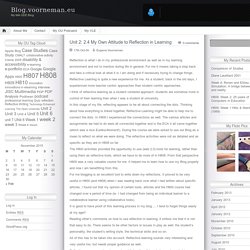
For me it means taking a step back and take a critical look at what it is I am doing and if necessary trying to change things. Reflective Learning is quite a new experience for me. As a student, back in the old days, I experienced more teacher centric approaches than student centric approaches. The long road to completing MAODE and beyond! Lesley on H800. H800 Technology Enhanced Learning: practices and. H800 - Community. The Open University H800 - Week 5 exercise. What did I learn from my H800 OU course?
Eyespyginger: VLEs and PLEs: the pros and cons of institutional and personal learning environments. Educational technology innovations thoughts/reports by Mandy Honeyman FHEA. CD-Vision. I want to post a big thank you to Forest Primary School, Guernsey for inviting me to visit their school.
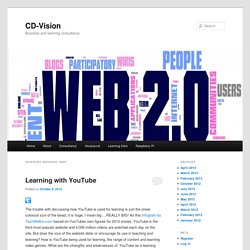
It was fantastic! The children, headmaster and staff were so friendly. I enjoyed my visit so much, what a great assembly! I couldn’t believe I was meeting an Olympic athlete and hearing all your interesting questions to Lee Merrien. Lee Merrien and Alun Williams at Forest School Guernsey Those of you who don’t know me from Facebook at ‘SelectLeeMerrien’ or follow me on Twitter as “Houseygirl”, I went to Guernsey last week to meet topTeamGB marathon runner Lee Merrien. Forest school meet TeamGB Olympic athlete Lee Merrien Lee told the children that when he was at school he wasn’t that good at running, but he loved sport and kept practicing till he became very good.
I had a wonderful time at Forest school, the whole school is bright, friendly and is packed full of projects, pictures and displays. Thoughts on Education, Technology and Development: H800. Communities of Practice The concept of Communities of Practice (COP) was introduced by Lave and Wenger (1991) to highlight and conceptualize forms of learning that focus on participation and are not limited to the individual level (don’t stop ‘at the skin of the individual’).
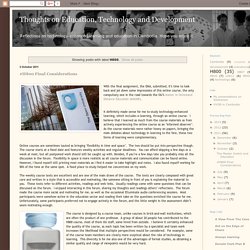
Legitimate peripheral practice is the conceptualization of the apprentice learning a craft with a master, thereby gradually developing mastery in the subject. In this way he showed that learning was an inevitable aspect of all productive practices and not limited to a formal setting within schools or institutions. The communities in the COP can be characterised as: - Clearly bounded structure, with rules for membership. H800 EMA. Nick daniels / blog. At about this time last year, at a cost of just under £2000, I signed up for the Open University module H800, Technology-enhanced learning: practices and debates.
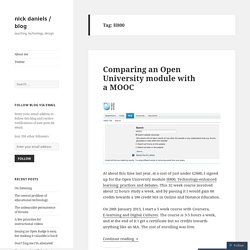
This 32 week course involved about 12 hours study a week, and by passing it I would gain 60 credits towards a 180 credit MA in Online and Distance Education. On 28th January 2013, I start a 5 week course with Coursera, E-learning and Digital Cultures. The course is 3-5 hours a week, and at the end of it I get a certificate but no credits towards anything like an MA. The cost of enrolling was free. H800 Technology-enhanced learning: practices and debates. “It is an attempt to harness the power of the computer in the service of the community.
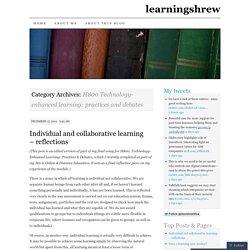
We hope to do this by providing a sort of super bulletin board where people can post notices of all sorts and can find the notices posted by others rapidly.” (The Well, n.d.) This is a description of “Community Memory”, a successful bulletin board created in Berkeley California in 1972 (Cellan-Jones, 2011). This shows that discussion boards are one of the “oldest” educational technologies around, predating, by some distance, the worldwide web, podcasting, video-sharing and the like (Dabbagh & Reo, 2010). As this is a mature, widely-used well-studied technology, there is plenty of material to help us study its impact. H800 Cloudquest challenge. This activity is a variant on the idea of a webquest, it provides a fun ways of exploring the cloudworks site and sharing findings.
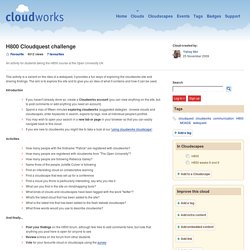
The aim is to explore the site and to give you an idea of what it contains and how it can be used. Introduction If you haven't already done so, create a Cloudworks account (you can view anything on the site, but to post comments or add anything you need an account)Spend a max of fifteen minutes exploring cloudworks (suggested stategies - browse clouds and cloudscapes, enter keywords in search, explore by tags, look at individual people's profiles You may wish to open your search in a new tab or page in your browser so that you can easily navigate back to this cloudIf you are new to cloudworks you might like to take a look at our 'using cloudworks cloudscape'. Activities How many people with the firstname "Patrick" are registered with cloudworks? H800: Assessment and Learning are (possibly) not the same thing. Image: digitalart / FreeDigitalPhotos.net I’m a happy bunny this week as the H800 module results came out, and I passed with a Distinction.
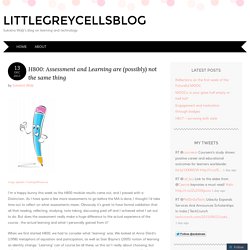
As I have quite a few more assessments to go before the MA is done, I thought I’d take time out to reflect on what assessments mean. Obviously it’s great to have formal validation that all that reading, reflecting, studying, note taking, discussing paid off and I achieved what I set out to do. But does the assessment really make a huge difference to the actual experience of the course , the actual learning and what I personally gained from it? When we first started H800, we had to consider what ‘learning’ was. Thoughts on Education, Technology and Development: #H800 Final Considerations.
It definitely made sense for me to study technology-enhanced learning, which includes e-learning, through an online course.
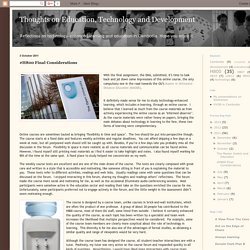
I believe that I learned as much from the course materials as from actively experiencing the online course as an ‘informed observer’. As the course materials were rather heavy on papers, bringing the main debates about technology in learning to the fore, these two forms of learning were complementary. Online courses are sometimes touted as bringing ‘flexibility in time and space’. The two should be put into perspective though. The Digital Nomad: Being an eTeacher, being an eStudent (Lernado.com)» Blogarchiv » Decentralised learning (H800, week 18, A1)
This week in course H800 sports the headline “Web 2.0, therefore Education 2.0” and – as the title lets us expect – deals with the significance of Web 2.0 technology on education.
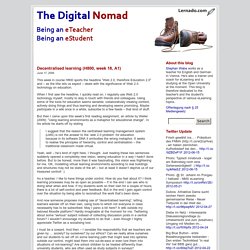
When I first saw the headline, I quickly read on. I regularly use Web 2.0 technology myself, mostly to stay in touch with friends and colleagues. Using some of the tools for education seems sensible; collaboratively creating content, actively doing things and thus learning and developing seems promising. Maybe participate in a wiki once in a while, subscribe to a few feeds – that kind of stuff.
But then I came upon this week’s first reading assignment, an article by Weller (2009): “Using learning environments as a metaphor for educational change”. I suggest that the reason the centralised learning management system (LMS) is not the answer to the ‘web 2.0 problem’ for education because in its software DNA it embodies the wrong metaphor. Yeah, well – he’s kind of right here, I thought.
The Machine is Us/ing Us (Final Version) Technology Enhanced as taught by the Open University Masters in Open & Distance Education (MAODE) « Mind Bursts. End-of-module assessment question (EMA) Length: 6,000 words.
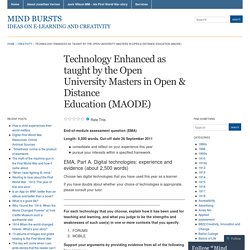
Cut-off date 26 September 2011. Personal Blogs. Open University H800 Block 2. JISC RSC Wales Blog. Last week I had the opportunity to use a virtual tool that I have been using for some time in a number of different ways. It is a tool that many, many people use, that quite a few use for education but that many, many more are sceptical about with regard to it’s relevance to teaching and learning. Google. Open University H800 TMA01. H800 TMA04.